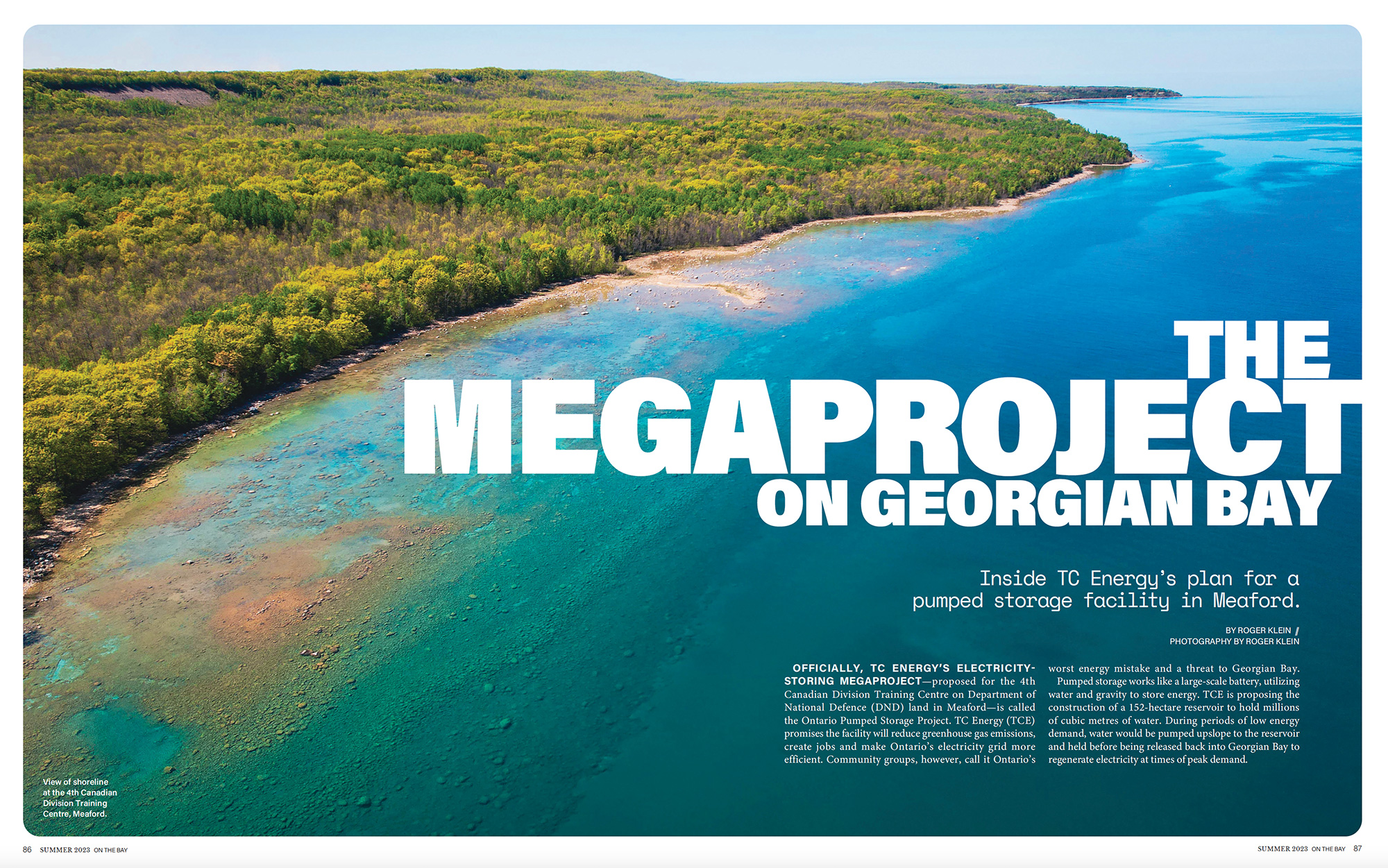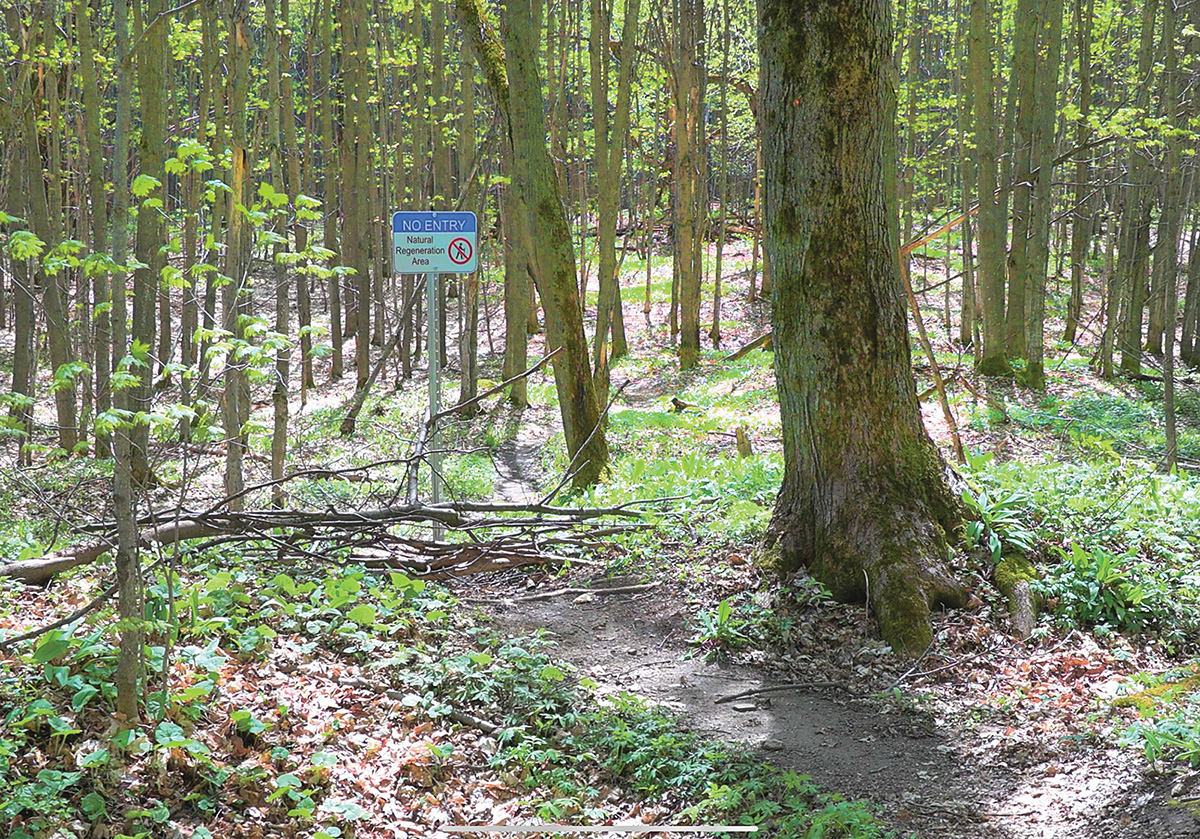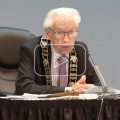
Pumped Power and Politics
As a resident of Meaford, I read your article on TC Energy’s pumped storage facility in Meaford/Georgian Bay (“The Megaproject on Georgian Bay,” Summer 2023) with interest and I have a few questions and comments.
How much is TC Energy going to pay to use taxpayer-owned Department of National Defence land for this project? I have friends whose home is below this proposed dam and no compensation has been offered, even though they think they will not be able to sell.
The federal government wants us all to be using EVs by 2030-35. The logical time to charge EV batteries is during the night using cheaper hydro—that’s if there is any left over from pumping water.
There are alternatives such as large-scale battery storage that can be sited close to power generating stations and cost a lot less. This is all about making money.
Geoff Bowler,
Meaford
The government of Ontario has reversed many bad decisions in the last five years. We know the pumped storage project (PSP) is no different than ravaging the Greenbelt. The Department of National Defence lands designated as an army training facility are carved out of the Niagara Escarpment Biosphere Reserve. Thus becoming a target for the TC Energy PSP.
In a fight for freedom, Martin Luther King Jr. said, “If you can’t fly, run. If you can’t run, walk. If you can’t walk, crawl, but by all means, keep moving.”
There was never a good argument for removing lands from the Greenbelt. The benefit claims for the PSP also don’t add up. The Ford government has learned a lesson on the importance of proper public consultation when making decisions that affect the natural environment. The PSP should be next on the list.
Support our fight to Save Georgian Bay with a contribution towards our efforts to uncover the facts to petition all levels of government and inform citizens around Georgian Bay and all Ontarians about the proposed PSP by TC Energy.
Save Georgian Bay,
savegeorgianbay.ca
It is with great interest that we read your article on the Pumped Storage Project (PSP). It is sprinkled with nice buzzwords on climate action, the promise of new jobs and a better electricity grid. Who can be against virtue?
Yet we feel voiceless. TC Energy’s PR machine has framed the conversation and the approval process in such a way that we feel powerless, and no one is discussing the real issues.
If we had a voice, we would be recognized as stakeholders. And we would be offered a project that would 1) be based on a more secure financial model, 2) deploy better technology, and 3) create a much smaller environmental footprint.
Only two stakeholders have a say in the approval process: The Department of National Defence (DND) and the First Nations community. For the rest of us, there is a feel-good café in Meaford, where a professional salesperson will turn all of our hesitations into selling points.
We sincerely hope that a biologist will step up and explain a very simple concept: the effect of a large water column on the Bay, especially on the fish reproductive cycle. Considering that the shore is the mating ground for most fish, if you disrupt them daily, you destroy the whole ecosystem.
To the First Nations communities that are in court to gain the right to the be the warden of the South Georgian Bay water, we invite them to mark the words of Tom Buck, quoted in your article about a PSP operating in Michigan: “We were horrified that it was killing millions of fish a year and the way it muddied up the water and we couldn’t conceive of that happening on this bay.”
Let’s look at the American experience with PSPs to gain some perspective. According to the U.S. Energy Information Administration (EIA), the PSPs still in operation were built between 1960 and 1990, and half of them in the 1970s. No new PSPs have come online in the United States since 2012. Why? PSPs consume more energy than they produce, by about 15 to 30 percent. Existing pumped storage systems operate at between 8 and 17 percent of their capacity. The financial model does not add up.
What would be the actual economic benefit? We predict about 8 to 17 percent of what is being promised. What would we be left with? Troubled water in the Bay and solid concrete covering hectares and hectares of the Escarpment.
We need to send the project back to the drawing table and choose a technology with a smaller environmental footprint.
How do we get out of this pit? We can see the big PR machine coming down on us, and it looks like a bad million-dollar circus, with corporate clowns flashing suitcases full of money. Even the article portrayed it as a done deal. The current consultation process will be followed by four years of construction. For us, that will be four more years of refusing to be voiceless.
We wish to be recognized as stakeholders and have a say in the decision. But since we aren’t, and we don’t, here is our message to TC Energy:
- •Have a good look at your numbers, and the existing data on the use and profitability of PSP. Your costs are out of line with the modest, expensive output to be expected.
- Move your project away from the Escarpment and the Bay (perhaps to an abandoned quarry) and close to a transmission line. Adopt better technology, like a closed-loop, brownfield approach. It will avoid troubling the water in the Bay, and give a nice green shade to your sea of concrete.
- Include local residents along the Bay as stakeholders in the decision process.
C. Thunder Martel
Patrick Ellard
Leslie Lacombe
Marcel Rutte
Marilyn Olivares
Fiona Dightam
Ben Cesar
Johanne Roberge

Access to Nature Impeded
Your editorial (“We need more access to nature, not less,” Summer 2023) certainly hit home to many residents in Grey Highlands. The need for more access to nature was especially evident here during COVID, but instead, access points to nature in the area were closed down.
The local council at the time voted not to renew leases to public accesses to Lake Eugenia, which is owned by Ontario Hydro. When “No Trespassing” signs went up, the users of these spaces fought to be heard. But it wasn’t until after three committee of adjustment hearings that our letters were read and our voices heard. Still, one access was closed and one will be kept for public access if Ontario Hydro will sell it to the municipality. It was a small victory but it’s not a done deal yet. This makes two accesses available for the public to the lake—one small public beach in the village of Eugenia and this contested one. Two is certainly not enough for a lake of this size.
We need to bring more awareness to the shrinking of our recreational areas and nature. I could also go on about the Talisman ski resort lands on one of the most scenic spots on the Niagara Escarpment being sold to developers who propose to put up over 500 homes. Where was the council looking out for public interests? Where was the Niagara Escarpment Commission? The lands were slated to be used for recreational purposes but that was not done. There is a group fighting that too.
There sure is an epidemic of closing nature down for the sake of development—development in the wrong places and not addressing affordable housing.
Akky Mansikka,
Eugenia
Trust the Pros on Trail Closures
I would like to chime in on the few trail closures in the Three Stage mountain bike area (“The Shifting Landscape on Mountain Bike Trails,” Summer 2023).
Firstly, I don’t believe opinions have more or less weight because of the years you have been riding the area. It’s not a union, there is no seniority. Furthermore, Collingwood has a large affluent community that enjoys privileges the rest of the world can’t even dream of such as private ski clubs, golf clubs and excessive homes with helicopters buzzing around. The entitlement of such people obfuscates environmentalism with economics!
The truth is, the trails have eroded drastically and this is impacting the natural environment. Riding in damp weather or shortly after rain multiplies the erosion as well as the use of motorized mountain bikes and the volume of riders. The code of staying off the trails after it rains has been disregarded by those that feel they are outside of the edict others uphold.
I welcome the trail closures. I welcome pay-to-play in our parks and beaches. I welcome parking closures. I welcome control over these areas by those professionally trained and educated in the science of nature and not the wishes of the elite that extend their carbon footprint wherever and whenever and try to justify it as economically good for Collingwood or the Town of The Blue Mountains or Clearview Township.
Steve Sam Cohen
Thank you so much for your letter, Steve. We agree that a nature-first approach is long overdue. However, I need to counter your assertion that mountain bike trails are eroded and in poor shape. In fact, the opposite is true: when we compare mountain biking trails to hiking trails it is clear that mountain biking trails are far less eroded and indeed more narrow than hiking trails—due to both the volunteers who maintain the trails, and the simple fact that mountain bike tires are narrower than a pair of hiking boots. Hence, the trails at Three Stage are in excellent condition, as a simple visual inspection will confirm. I would also like to point out that access to nature is not a privilege of the rich; instead, it’s an accessible activity that boosts mental health, reduces stress, is free (particularly important in today’s highly expensive world)—and, for the middle and lower class, an important personal and family activity. Local leaders should prioritize the preservation of natural spaces and access to them for the general population—not the enforcement of parking closures driven by the people who live near the natural areas in homes most of the population will never be able to afford.
David Loopstra,
Publisher














